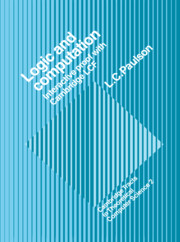8 - Tactics and Tacticals
Published online by Cambridge University Press: 17 September 2009
Summary
Tactics accomplish backwards proof. You begin with a goal — a statement of the desired theorem — and reduce it to simpler subgoals, forming a proof tree. A tactic reduces a goal to a list of subgoals such that if every subgoal holds then the goal holds also. If the list of subgoals is empty then the tactic has proved the goal. The standard tactics allow reasoning about logical connectives, substitution, induction, and rewriting. A tactic is a higher order function. It not only reduces a goal to subgoals, but returns a proof function to justify its action.
It is worthwhile to develop tactics specifically for the theory at hand. Operations called tacticals, which treat tactics as data, construct sophisticated tactics from simple ones. It is seldom necessary to code a tactic in low-level ML: the standard tactics and tacticals form a language of proofs. Constructing a tactic from simpler ones promotes readability and avoids many kinds of error. The tactic steps of a proof can be composed to form a single tactic, giving a surprisingly readable synopsis of the proof. Tacticals are a prime example of higher order functions in LCF.
The subgoal package provides commands for backwards proof. It manages the subgoal tree, presenting the user with unsolved goals. When the last subgoal has been solved, it produces the final theorem.
Information
- Type
- Chapter
- Information
- Logic and ComputationInteractive Proof with Cambridge LCF, pp. 209 - 244Publisher: Cambridge University PressPrint publication year: 1987
Accessibility standard: Unknown
Why this information is here
This section outlines the accessibility features of this content - including support for screen readers, full keyboard navigation and high-contrast display options. This may not be relevant for you.Accessibility Information
- 2
- Cited by
